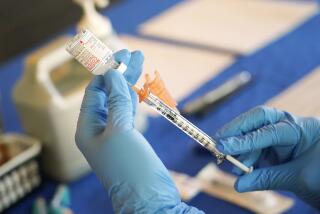FDA panel backs a new sleep drug
- Share via
An advisory panel to the Food & Drug Administration has recommended approval of a new sleep drug that targets the brain’s wakefulness centers, but suggested the agency should consider a dose of the drug, called suvorexant, lower than that proposed by the medication’s maker, Merck. In doing so, members of the FDA’s advisory committee on peripheral and central nervous system drugs appeared to agree with concerns raised by FDA staff scientists that, at higher doses, the sleep medication may cause dangerous next-day drowsiness in some patients.
The panel voted 13-to-3 in favor of sending the FDA a positive recommendation on marketing approval for suvorexant with a maximum dose of 20 mg for non-elderly patients and 15 mg for elderly patients.
While the FDA’s staff scientists had cautioned that there is “much less safety data” for suvorexant at the 10-mg dose the advisory panel suggested, they also had flagged safety concerns that focused heavily on daytime somnolence among those taking the medication at doses of 30 and 40 mg. In trials run by Merck, 11% of 1,291 subjects taking high doses of suvorexant suffered somnolence into the next day (and 0.6% suffered severe somnolence), vs. 7% 0f 493 subjects who took lower doses of the drug (among whom 0.2% suffered severe somnolence).
Merck has conducted only preliminary trials on the safety and effectiveness of suvorexant at the 10-mg dose widely discussed by the FDA advisory panel Wednesday. The company had recommended that elderly patients with trouble falling and staying asleep get the medication at a 15-mg starting dose, with non-elderly patients starting at 20 mg. Patients who tolerated those doses could step up to the 30-mg and 40-mg doses, the company suggested.
FDA scientists, summarizing safety trials of those taking the sleep medication, warned that the data “suggests serious risk from drug-impaired driving.” They cited several cases of patients, some of them seniors who were taking the drug’s higher dose, who reported they were fighting off the urge to sleep behind the wheel the day after taking the medication.
The FDA staff also raised worries about subjects’ reports of “narcolepsy-like syndrome,” including vivid dreams, sleep paralysis, and weakness in the knees upon laughing — a possible sign of cataplexy.
Suvorexant inhibits the effects of wakefulness-promoting orexin neurons of the brain’s arousal system, allowing patients who have difficulty falling asleep to do so, and preventing nighttime wakefulness. If approved by the FDA — which often but not always follows its advisory panels’ recommendations — suvorexant would join several other classes of sleep aids taken by many of the estimated 10 % to 30% of Americans who suffer insomnia.
On Wednesday, the FDA panel agreed, in a 16-0 vote, that suvorexant is effective in inducing sleep. The members were somewhat more divided, voting 12-4, on the drug’s effectiveness in maintaining sleep.
Public Citizen, a watchdog group which frequently raises concerns about FDA decisions, had urged the panel not to recommend approval of suvorexant. “Its marginal benefit in extending overnight sleep by a few minutes is achieved at the expense of prolonged next-day drowsiness, with potentially fatal consequences, in addition to a litany of other serious side effects,” Dr. Sammy Almashat of Public Citizen told the committee Wednesday.
Darryle Schoepp, senior vice president of Merck Research Labs for neuroscience and ophthalmology, said in a statement Wednesday evening that the firm was “excited about the potential of suvorexant as a new and different approach to treating insomnia,” adding that Wednesday’s vote brought the company “one step closer to providing physicians with another option to help patients struggling with insomnia.”







